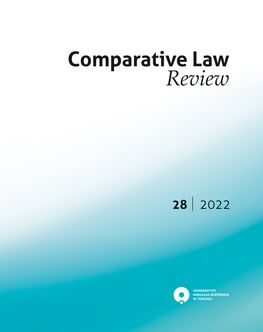DEVELOPMENT OF THE CONCEPT OF CORPORATE SOCIAL RESPONSIBILITY: PRACTICE IN UKRAINE
DEVELOPMENT OF THE CONCEPT OF CORPORATE SOCIAL RESPONSIBILITY: PRACTICE IN UKRAINE
Author(s): Olena Honcharenko, Larysa Leonidovna Neskorodzhena, Iryna Iefremova, Iryna Lomakina, Inna MalyshkoSubject(s): Economic policy, Financial Markets, Peace and Conflict Studies, Commercial Law, Russian Aggression against Ukraine
Published by: Wydawnictwo Naukowe Uniwersytetu Mikołaja Kopernika
Keywords: concept of corporate social responsibility; non-financial reporting; self-regulation; economic activity; legal support; advocacy; Russian war against Ukraine; CSR in wartime;
Summary/Abstract: The article considers topical issues of the implementation of the concept of corporate social responsibility (CSR) in Ukraine. It is emphasized that the concept of corporate social responsibility involves changes in the legal support of the self-regulation of economic activity. CSR in Ukraine includes the voluntary establishment of norms on social corporate responsibility and determination of the mechanism and means of its implementation. The submission of a corporate social responsibility report is an essential element of CSR though it is not currently mandatory in Ukraine. In Ukraine, the development of CSR in agriculture should be a priority. It has been established that CSR advocacy is insufficient in Ukraine, and therefore public authorities and non-governmental organizations have to introduce the practice of explaining the need introduce and implement CSR institutions through seminars, conferences, training on responsible business behavior, educational programs, and training courses. Observance of labor rights and guarantees should be a mandatory task for Ukrainian companies in terms of CSR development. It is proposed to amend a number of regulations namely the Law of Ukraine “On Business Associations” and the Economic Code of Ukraine. The creation of the Concept for the Development of Corporate Social Responsibility should determine the prospects and directions of CSR support by the state, expand the interaction between business entities and civil society, systematize existing and prospective tools for its development. Such changes update the implementation of the rules of the Association Agreement between Ukraine and the EU and they will facilitate the implementation of the rules on CSR liability in practice. Taking into account the ongoing war of Russia against Ukraine since 2014 and its new stage – the full-scale invasion by Russia of Ukraine in 2022, business entities have proposed the separation of CSR policies in the conditions of war. Human rights protection of the conditions of war, workers’ safety (mobilization, evacuation), the organization of the business entity’s work (the responsibility of each employee from the head of the company to the lower level of the executive, payment of labor, taxes, etc.); assistance to the state, armed forces, employees, and other citizens, termination of cooperation with counterparty residents in the Russian Federation and Belarus, withdrawal from the market, etc. of these countries should become the key elements of such policies. The preservation of human life will be an overriding imperative of CSR in wartime.
Journal: Comparative Law Review
- Issue Year: 28/2022
- Issue No: 1
- Page Range: 367-392
- Page Count: 26
- Language: English

